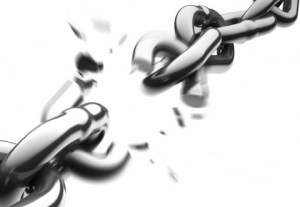 Last month we begun the series of breaking those stubborn chains in our lives that have had us bound for years. This writer introduced the Chain of Self-Deception and the Chain of Selfishness. Due to the popularity of the articles and your request, this month this writer will present two additional chains that need to be addressed and subsequently broken: the Chain of Self-Indulgence and the Chain of Ingratitude.
Last month we begun the series of breaking those stubborn chains in our lives that have had us bound for years. This writer introduced the Chain of Self-Deception and the Chain of Selfishness. Due to the popularity of the articles and your request, this month this writer will present two additional chains that need to be addressed and subsequently broken: the Chain of Self-Indulgence and the Chain of Ingratitude.
In the epistle of James, the Apostle was writing to the Christian community around Jerusalem. He described this community as the twelve tribes in the diaspora. Those Christians living in Jerusalem were persecuted by the Roman Empire and were forced to settle outside of Jerusalem. As they started life anew in the regions of Palestine, they began taking on the ways of the world. Thus, James issued both a commendation and a condemnation against the believers because there were significant divisions between the rich and the poor. In Chapter 5, James warned the wealthy merchants not to be self-confident in the security of their wealth. James admonished the rich landowners against defrauding their laborers of wages earned and against their insensitivity, mistreatment and the neglect of the poor. In James 5:4 James stated: “Look! The wages you failed to pay the workers who mowed your fields are crying out against you. The cries of the harvesters have reached the ears of the Lord.” Then in James 5:5, the Apostle told them: “You have lived on earth in luxury and self-indulgence. You have fattened yourselves in the day of the slaughter.” What an indictment!
Author and humorist Finley Peter Dunne in the 1890s wrote of the gospels, they were written, “to comfort the afflicted and afflict the comfortable.” Perhaps, the same can be said of the book of James. James afflicted the wealthy and comforted the poor. It is in this regard James’ critique of the wealthy reached its crescendo in Chapter 5. James invited the wealthy who have abused and misused their wealth to weep and mourn for themselves because of the ruin that will come upon them. James accused the rich of living in luxury and self-indulgence.
Today, there are many of us who think life is relative and behavior is a matter of opinion. We are quick to rationalize excessive lifestyles as relative. In our culture greed is normative and excess does not seem like much to us. We are quick to say if that is what a person wants to do with his/her money so what? But, God expects more from His people! Right now, America cannot agree on a living wage for the poor, but on Wall Street there seems to be no problem paying corporate executives millions of dollars in bonuses. God expects more! America is still ranting over health care for the poor, while Congress has full health care provided for them. God truly expects more! James was concerned because God expected more! Therefore, James rebuked the mistreatment of the poor by the rich, because God expected more then and God expects more of us today! For James this was an easy conversation because the opposite of self-indulgence is self-denial. James’ brother Jesus said Jesus’ disciples must deny themselves if they are to follow Him. We are disciples of the Christ and we must also deny ourselves. In a society such as ours there is so much evidence that too many of us are bowing at the altar of the strange gods of greed, materialism and riches. Make no mistake about it…self-indulgence is a serious sin of the flesh and leads to excessive striving for yet more worldly pleasure.
Beloved, in James 5, the Apostle was not condemning wealth, rather the lack of perspective and priority about wealth. The wealthy in the Bible are compelled to be fair, just, and liberal in charity to those who are the needy. In fact, the Bible condemns hoarding or self-indulgence as sinful and displeasing to God. (See Matthew 6:19-21).
Next Week: Continuation
The writer does not assume responsibility in any way for readers’ efforts to apply or utilize information or recommendations made in these articles, as they may not be necessarily appropriate for every situation to which they may refer. Rather, the objective is strictly informative and educational. If you would like to contact Rev. Lester, write to her c/o P.O. Box 121, Brookfield, WI. 53008.








